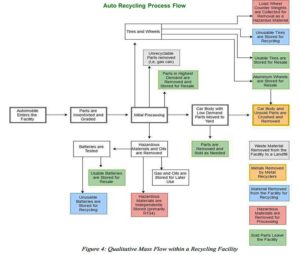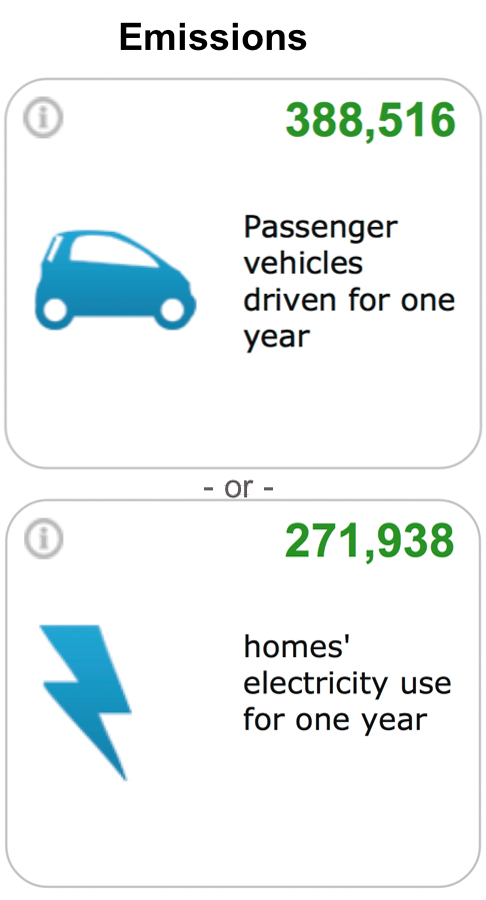WPI Study Finds Auto Recyclers Reduce State’s Carbon Footprint
By reclaiming auto parts for re-use, then recycling the steel and aluminum left in vehicles at the end of their usable life, members of the Automotive Recyclers of Massachusetts (ARM) reduce the state’s carbon footprint by at least 2.2 million tons of carbon dioxide annually, according to a new study completed at Worcester Polytechnic Institute (WPI).
“What the automotive recyclers are doing is saving materials, saving energy and impacting the environment in a positive way, in a great sense,” said Professor Brajendra Mishra, PhD, director of the Metal Processing Institute at WPI and advisor overseeing the study.
The study “Assessing the Environmental Impact of Automotive Recyclers of Massachusetts” was done by four WPI seniors as their Major Qualifying Project to complete their degrees in mechanical engineering. Through intensive site visits and a survey of other companies, the team examined operations at auto recycling facilities across Massachusetts and documented their processes for reclaiming auto parts, recycling metals and capturing fluids like oil, gasoline and antifreeze to process properly.
 The study found an estimated 165,500 vehicles are recycled by ARM members in a typical year. The team then calculated the energy saved by re-using auto parts from those vehicles, like engines and transmissions, versus manufacturing new parts. They also calculated the energy saved by recycling the steel and aluminum left in the vehicles, rather that mining ore and refining new metals. That analysis showed 2.2 million tons of the leading greenhouse gas carbon dioxide (CO2) was saved by reducing the need to refine new materials.
The study found an estimated 165,500 vehicles are recycled by ARM members in a typical year. The team then calculated the energy saved by re-using auto parts from those vehicles, like engines and transmissions, versus manufacturing new parts. They also calculated the energy saved by recycling the steel and aluminum left in the vehicles, rather that mining ore and refining new metals. That analysis showed 2.2 million tons of the leading greenhouse gas carbon dioxide (CO2) was saved by reducing the need to refine new materials.
By putting metals and useable parts back into the automotive supply chain, the ARM companies help drive a “circular economy” in auto manufacturing, Professor Mishra said. “We make a car. We use a car, and we completely recycle the car so the materials stay in the system, in a circle,” he said.
Fostering a circular economy across many industries is vital for the long-term sustainability of our society, Professor Mishra said. “The total primary resource available on the Earth is going down. The quality of those resources is going down. Whereas with the increase in population, the demand for materials is increasing, so we have no other choice but to recycle these materials and put them back into the system,” he said.
The study was sponsored in part by ARM and conducted independently at WPI. “Our members are focused on recycling every day, but this is the first time we have verified the collective positive impact our industry has on the Massachusetts environment,” said Scott Robertson Jr., a director of ARM and a member of the Executive Committee of the Automotive Recyclers Association, which represents the industry globally. “We are fortunate to have the world-class expertise of WPI and the Metal Processing Institute here in Massachusetts to take on this analysis.”
Key excerpts:
“The study has determined that for this specific industry, the carbon footprint is significantly negative. The key point to understand is the massive reduction in energy required to refine scrap instead of virgin metal.”
“The amount of savings in tons of carbon for the ARM was approximately 2.2 million tons a year.”
“The largest positive impacts to the environment are made by reusing transmissions and engines. Considering the large number of wheels and tires that are recycled, the comparatively small savings are not negligible.”
“Without even considering the energy cost of mining, transporting, and refining virgin steel, it is still evident from simply the magnitude of material needed for producing cars that proper automotive recycling can have an enormous benefit to the environment.”
“All facilities were in compliance with the state regulations and almost all the fluids were reused in house.”
Key Points
165,000 vehicles recycled
2.2 million tons C02 saved
Oil, antifreeze, Freon, lead, mercury and other hazardous wastes captured safely
Energy saved by recycling:
Steel—75 %
Aluminum – 95 %
Most re-used parts:
Engines
Transmissions
Doors
Tires
Wheels
Mirrors
Lights
CO2 SAVED EQUALS

